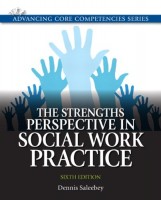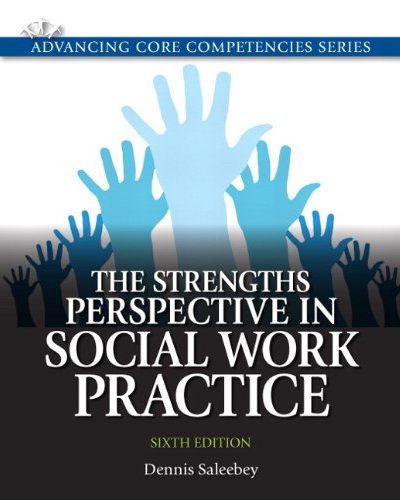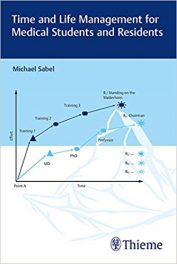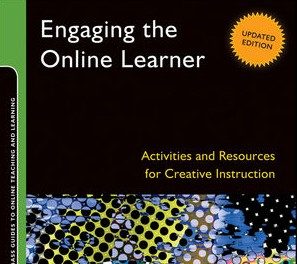 Author: Dennis Saleebey
Author: Dennis Saleebey
Publisher: Pearson – 332 pages
Book Review by: Paiso Jamakar
This book was first published in 1992, so the fact that it’s been around for more than two decades and has been renewed and updated five times with new information and insight gained, speaks well for Dennis Saleeby of course, and also because it has aroused a lot of people’s interest in the strengths perspective, as a new way to help clients of social workers and others, in allied fields.
What is the strengths perspective? It is a way of looking at people based on their inherent strengths, or positive qualities. For a long time now, professionals who help those that have challenges in their social relationships (including family members and police officers) have been focusing on their clients’ negative qualities, and how to change their thinking and behavior.
These professionals are in the business of counseling troubled people. They are, for example behavioral therapists, clinical psychologists, correctional officers, mental health specialists, psychiatrists, and others that are in the “helping professions.”
Who do they help? Myriad groups of people, such as for example, angry teens who have vented their frustration by shooting and killing their fellow students (whom we’ve seen a lot lately on television), criminals confined in prisons including recidivists, patients (including those in straitjackets) in mental hospitals, and those found on building rooftops or edges of bridges about to jump to end their lives.
How has the use of the strengths perspective in helping people been faring? Dennis Saleebey points out: “while it is true that the strengths perspective has made encouraging inroads into practice, education, and inquiry, it remains far from being the dominant discourse.” Like most new approaches to old problems, it takes much effort to change people’s patterns of thinking to try new things.
This book is mainly for students taking advanced courses in social work, but also for anyone interested in new solutions to old problems. In it, Dennis Saleebey explains the basics and the details of the strengths-based approach to social problems and how it has (or hasn’t) worked in different sectors of society, including how to overcome the challenges it faces, and the tremendous potential it holds for positive change in people, that can result in happier lives and a more harmonious society.
Here below is a list of chapters of this book, which gives you an overview of what he and 21 other authors of the 15 chapters have written.
- Introduction: Power in the People
- Learning and Practicing the Strengths Perspective: Stepping Out of Comfortable Mind-Sets
- Integrating the Core Competencies in Strengths-Based, Person-Centered Practice: Clarifying Purpose and Reflecting Principles
- Chronic Illness and Spiritual Transformation
- The Strengths Approach to Practice Beginnings
- Human Rights and Sexual Orientation
- The Strengths Perspective in Criminal Justice
- “Knowing” the Effectiveness of an Evidence-Based Practice: Strengths-Based Case Management with Substance Abusers
- The Strengths Model with Older Adults: Critical Practice Components
- Assessing Strengths: Identifying Acts of Resistance to Violence and Oppression
- A Shift in Thinking: Influencing Social Workers’ Beliefs About Individual and Family Resistance in an Effort to Enhance Well-Being and Success for All
- Animating Hope: An Essential Ingredient of Strengths-Based Practice
- Exploring the True Nature of Internal Resilience: A View from the Inside-Out
- Poverty Through the Lens of Economic Human Rights
- The Strengths Perspective: Possibilities and Problems
You can get more from this book from Pearson’s online resource MySocialWorkLab found at http://www.mysocialworklab.com/. Pearson is the world’s oldest book publisher, founded in 1844, and also the largest in educational books. Here is what this online resource provides you:
Proven Results – For over 10 years, instructors and students have reported better grades through increased engagement and real-time insights into progress.
Engaging Experiences – MyLab is designed to reach students in a personal way. Engaging learning and practice opportunities lead to assessments that create a personalized study plan:
- A complete eText – Just like the printed text, you can highlight and add notes to the eText online or download it to your iPad.
- Assessment – chapter quizzes, topic-specific assessment and flashcards offer immediate feedback and report directly to your gradebook.
- Chapter-specific learning applications – ranging from case studies to videos, and more.
- Writing and research Assistance – A wide range of writing, grammar and research tools and access to a variety of academic journals, census data, Associated Press newsfeeds, and discipline-specific readings help you hone your writing and research skills.
A Trusted Partnership – With millions of students registered annually, MyLab is the most effective and reliable learning solution available today.
To order this text with MySocialWorkLab, use ISBN 0-205-04244-9.
This book delves into the challenges the strengths perspective faces, as well as the promises it holds. It requires courage to be realistic but optimism to be promising, and Dennis Saleebey has shown both in this book. Moreover he displays extraordinary intelligence and hard work, which is why this book has lasted for more than 20 years and is now in its sixth edition.
Author and Editor:
Dennis Saleebey is affiliated with the School of Social Welfare at the University of Kansas.
Contributors:
Kim M. Anderson
Gary Bailey
Rosemary Barbera
Monica Beemer
Bonnie Benarde
Dr. Robert Blundo
Mary Bricker-Jenkins
Edward R. Canda
Rosemary Chapin
Michael D. Clark
Becky Fast
Destinee F. Floyd
Walter E. Kisthardt
Timothy Lane
Diane P. McMillen
Holly Nelson-Becker
Jack Pransky
Richard R. Rapp
Dennis Saleebey
W. Patrick Sullivan
Sara Truebridge
Carrie Young







